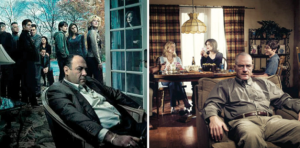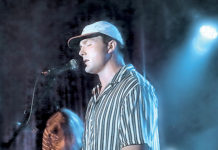Television and film watchers develop a habit of comparing people in their own lives to those depicted on the screen. Whether it’s the belief that Elaine Benes is your spirit animal or that your best friend encompasses the moral code of Coach Eric Taylor, today’s entertainment is enjoyed because of the simple notion that the story and its characters are relatable to the audience.
Why then are so many people invested in the characters that, for one reason or another, are dishonest and lack ethical reasoning? Surely not everyone in the audience is the head of a crime family, or a teacher who dabbles in the drug world, or a police forensics expert who moonlights as a murderer. So what’s behind this interest and celebration of bad?
The majority of audiences cannot relate to the closeted lives that nearly all characters on television possess. Most people lead private lives and live the one life they’ve made for themselves. They don’t have a second life, nor would they even know where to begin in order to have one. But what these characters also obtain, and what is identifiable to so many, is the fact that they constantly have to get a handle on domesticity. In nearly every show, the main character is grappling, to a certain extent, with the monotony of life and the repetitiveness of suburban living. How do I get by from this day to the next? Will I ever be able to play out my restrained desires?

While most leading characters are men, women, too, can surely relate to television’s “complex man.” Inner struggles are what define not only the characters, but also us, the audience. Complexity is in our makeup, it’s what makes us interesting, and it’s also what makes us so troubled. Because more often than not, we are persistent in trying to suppress those said complexities in fear that we – and they – will not be accepted.
This era, or what is being called The Third Golden Age of Television, deals mainly with a newly composed face for the TV Dad. These men aren’t Ward Cleaver or Mike Brady. They’re not making it home by 5 o’clock every weekday evening. Most of them aren’t making it home at all. They’re unfaithful, they’re liars, they’re crooks. Some are emasculated by their wives, some are poor providers, and yet, all of them represent today’s everyday man.
They’re the men who so badly want the idyllic life with the wife and the children but – and this is what makes them so entertaining – they also actively entertain their inclination to act on the taboos of sex drive and self-absorption.
Tony Soprano is arguably the trailblazer for this breed of TV character. He’s an unlikely sex symbol, yet he is one for both men and women. He attracts women because he’s a provider, he loves his children, and he makes great strides in protecting his familial unit. He attracts men because he’s able to partake in that seductive second life. For men, seeing Tony helps with their wish fulfillments. He helps actualize what so many men leave dormant. He can have it all. He can do what he pleases. He can, he can, he will. For women, watching Tony gives them an opportunity to fix him. Ultimately, the women viewers are nurturers and when faced with a perplexed individual, their reaction is not to run but rather stay and ensure this person will eventually align with good.
Oh, if only he wasn’t born into a line of mobsters, he’d be such a loving father.
It’s true; Tony does show signs of being a devoted father, and even towards the end of the series, a devoted husband, too. But his spin at turning into one of the most violent men will always remain.
And it is this yin and yang personality, which is now the basis for every character on television, that keeps the male audience entertained and the female audience addicted to the hope that there will be a forthcoming change.
It’s interesting to wonder whether or not today’s youth will adjust the traits of future television characters in order to be more wholesome. As of now, they only know the identities of truly elaborate main characters. Will history repeat itself to the point where the future generation will only want to watch entertainment featuring upstanding citizens? Heroes will replace criminals. Monogamy will be celebrated. Order will overcome brutality.
But come on, where’s the fun in that?
Ashley Peter writes the Reel Remarks column in the Two River Times. She is a writer and Two River area native who works in the film and television industry.














